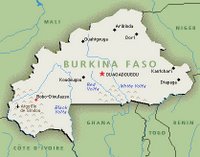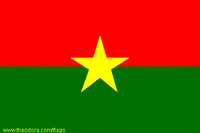As promised, I have some info about Burkina Faso for those of you who are not familiar with the country. I just got back to PEI for a nice two week vacation and I will be heading out to Ireland and then Burkina Faso in a short 16 days :)
*Neighboring Countries: Mali, Niger, Benin, Togo, Ghana and Ivory Coast (Cote D’Ivoire)
*Population:12.1 Million
*Capital: Ouagadougou (1.2 Million)
*Major Cities: Bobo-Dioulasso, Po, Yako, Dori, Fada
*Life Expectancy: 47.5 Years
*Annual GDP: $3.1 Billion US
*Language: French (official language), Moore, Dioula and Fulfulde (national languages), dozens of local languages
*Religion: Animist, Muslim, Christianity
*Currency: Communaute Financiere d’Afrique (CFA) franc.
A Brief History
The story of how Burkina Faso became is difficult with very few written recollections; most of the history we know began with French occupation in the late 1800s. Mossi oral accounts dominate, telling us that they were descendents of Nedega, a powerful Mamprusi chief who ruled the kingdom of Gambaga, in northern Ghana. The exact details of the story are confused, but the basic understanding is that Nedega refused to marry his eldest daughter, Yennenga, because of her considerable fighting prowess. The story varies as to whether Yennenga escaped her fathers overbearing court or whether her horse bolted while she was out riding, but she got lost, far from home in a forest. Here she encountered Riale, an elephant hunter said to be of Mande origin. They fell in love and named their son, Ouedraogo (‘stallion’ in memory of the horse that brought them together). Ouedraogo was the first Mossi.
The Mossi were highly organized and as a result the population enjoyed security much higher than was found in other places. A French historian wrote:
The Mossi empire was centralized. The internal struggles often seen with other groups, between villiages, neighborhoods ad even compounds, do not exist with the Mossi. Therefore they have internal peace and security. . . . One is struck upon entering Mossi country by the absolute security that the population enjoys, where everywhere else war and slave-raiding parties desolate villages. One notices with envy the Mossi peasants who go out alone in their fields . . .
Documented history began with French colonialism. While Burkina Faso didn’t offer much in resources to the French, it was an important geographical bridge between Cote D’Ivoire and Mali. Since colonization, it has changed names five times: at first is was a part of an amalgamation state that consisted of today’s Mali, Niger and Burkina Faso, called Colonie du Haut – Senegal – Niger. In 1919 is was renamed Upper Volta or Haute Volta. In the 1930s, the French dissolved Upper Volta and split it amongst Mali and Cote d’Ivoire. In 1947, when the initial pushes for West African independence where making noise, colonial authorities decided to recreate Upper Volta. In 1958 it was again renamed the Voltaic Democratic Union and within two years, Upper Volta was an independent country.


